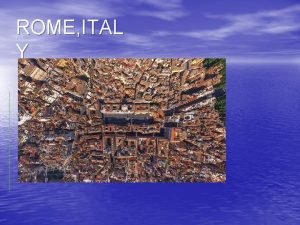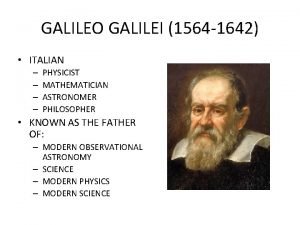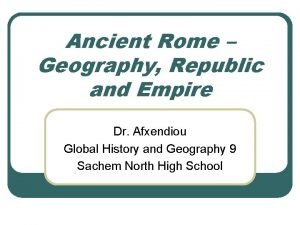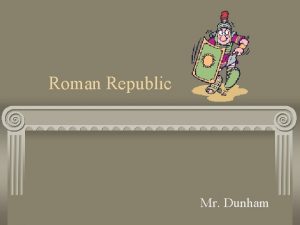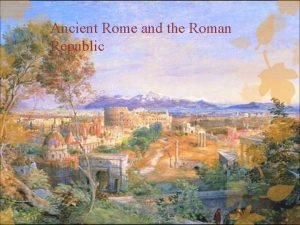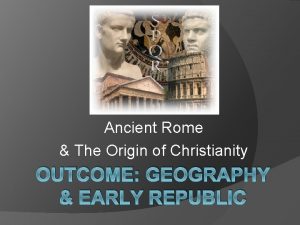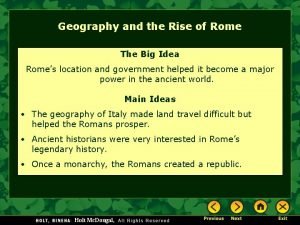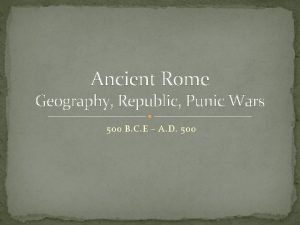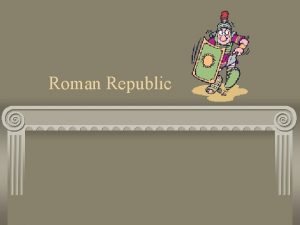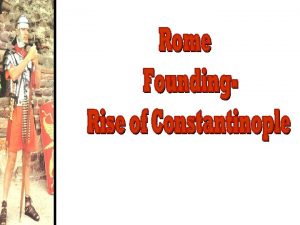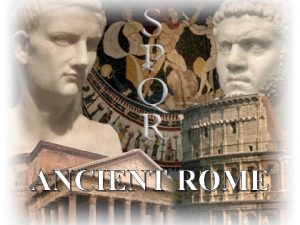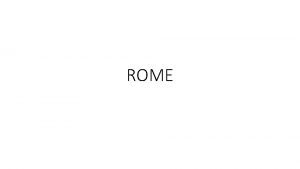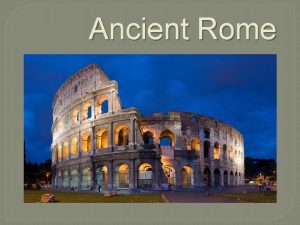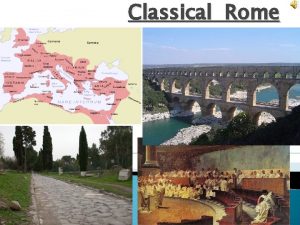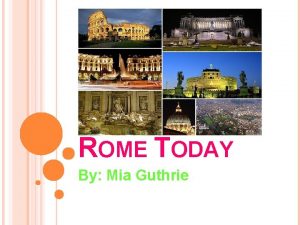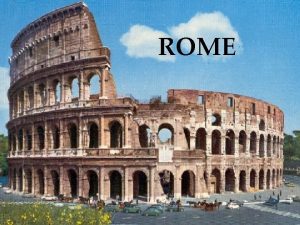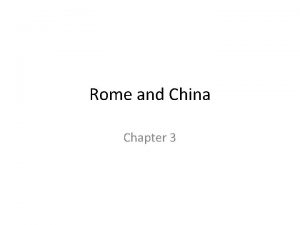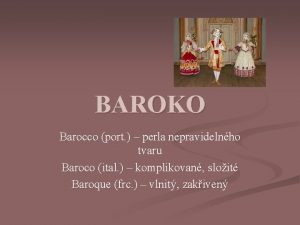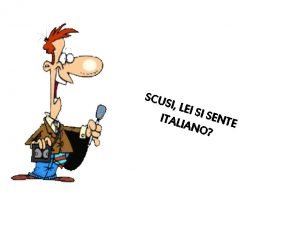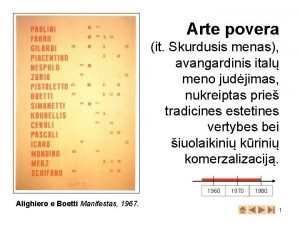ROME ITAL Y GEOGRAPHY The Geography of Rome


















- Slides: 18

ROME, ITAL Y

GEOGRAPHY The Geography of Rome is characterized by the Seven Hills and The Tiber River. Rome city is situated on the eastern banks of river Tiber. Rome lies to the west of the Apennine Mountains. Being close to the Tyrrhenian Sea, Rome experiences a Mediterranean climate. Rome is popularly called 'the city of seven hills'. In ancient Rome each of the seven hills had separate walled cities. This river Tiber, 405 km long, has played a significant role in shaping Rome's history and culture.

ROME CLIMATE The climate very broadly is of the 'Mediterranean' variety. The summer months are warm to mild, and the winters are cold. The rainfall occurs during the winter months between October to January. The summer season lasts from June to September. Rome’s climate is conducive to travelling throughout the year.

HISTORY According to legend, Ancient Rome was founded by the two brothers, and semi-gods, Romulus and Remus, on 21 April 753. The legend claims that, in an argument over who would rule the city (or, in another version, where the city would be located) Romulus killed Remus and named the city after himself. This story of the founding of Rome is the best known but it is not the only one. Other legends claim the city was named after a woman, Roma, who traveled with Aeneas and the other survivors from Troy after the city fell. Aeneas of Troy is featured in this legend also, famously, in Virgil's Aeneid, as a founder of Rome.

EARLY ROME Originally a small town on the banks of the Tiber River, Rome grew in size and strength, early on, through trade. The location of the city provided merchants with an easily navigable waterway on which to traffic their goods. Greek culture and civilization, which came to Rome via Greek colonies to the south, provided the early Romans with a model on which to build their own culture. From the Greeks they borrowed literacy and religion as well as the fundamentals of architecture. The Etruscans, to the north, provided a model for trade and urban luxury. Etruria was also well situated for trade.

WAR & EXPANSION Though Rome owed its prosperity to trade in the early years, it was war which would make the city a powerful force in the ancient world. As the Republic of Rome grew in power and prestige, the city of Rome began to suffer from the effects of corruption, greed and the over-reliance on foreign slave labor. The wealthy elite of the city were called the Patricians and the working lower class, the Plebeians.

THE REPUBLIC Rome found itself divided across class lines. The ruling class called themselves Optimates (the best men), while the lower classes, or those who sympathized with them, were known as the Populares (the people). In general, the Optimates held with traditional political and social values which favored the power of the Senate of Rome and the prestige and superiority of the ruling class. The Populares favored reform and democratization of the Roman Republic. Marcus Licinius Crassus and his political rival, Gnaeus Pompeius Magnus (Pompey the Great) joined with another, younger, politician, Gaius Julius Caesar, to form what modern historians call the First Triumvirate of Rome.

JULIUS CEASAR Both Pompey and Caesar were great generals who, through their respective conquests, made Rome wealthy. In 53 BC Crassus was killed in war. With Crassus gone, the First Triumvirate disintegrated and Pompey and Caesar declared war on each other. Ceasar crossed the Rubicon River with his army in 49 BC and entered Rome and defeated Pompey.

TOWARDS EMPIRE Julius Caesar was now the most powerful man in Rome. He effectively ended the period of the Republic by having the Senate proclaim him dictator. His popularity among the people was enormous and his efforts to create a strong and stable central government meant increased prosperity for the city of Rome. He was assassinated by a group of Roman Senators in 44 BC. The conspirators, Brutus and Cassius among them, seemed to fear that Caesar was becoming too powerful and that he might eventually abolish the Senate. Octavian, Antony and Lepidus formed the Second Triumvirate of Rome.

ROMAN EMPIRE

ROMAN -SIGHTS Ø COLOSSEUM Ø ROMAN & IMPERIAL FORUMS Ø ST. PETER’S BASILICA Ø TREVI FOUNTAIN Ø THE PANTHEON Ø SPANISH STEPS Ø CASTEL SANT’ ANGELO Ø PIAZZA NAVONA

COLOSSEUM The Colosseum (built 70 AD - 80 AD) is an elliptical amphitheatre and the largest ever built in the Roman Empire. With a seating capacity estimated at 50, 000 to 70, 000, the Colosseum was used for gladiatorial contests and public spectacles. Today, the Colosseum is the symbol of Rome worldwide.

ROMAN & IMPERIAL FORUMS Located between the Coloseum & Vittorio Emanuele II monument in Piazza Venezia, the forums were the heart of the late Roman Republic and of the Roman Empire. The Roman Forum was the central area around which ancient Rome developed.

ST. PETER’S BASILICA Saint Peter's Basilica is the largest building in Christendom and is one of the holiest sites of Christianity in the Catholic tradition. It is 190 m long, the aisles are 58 m wide, the dome is about 136 m high as far as the cross. It can host 20, 000. Directly to the east of the church is the impressive St Peter's Square (Papal blessings take place every Sunday at noon, except in summer).

TREVI FOUNTAIN The Trevi Fountain, is the largest of the Baroque fountains of Rome — standing 25. 9 m high and 19. 8 m wide. The fountain was designed by Nicola Salvi, and finished by Giuseppe Pannini, following Salvi's death in 1751. A traditional legend holds that if visitors throw a coin into the fountain, they are ensured a return to Rome.

THE PANTHEON The Pantheon, was built by the Romans in 125 AD as a pagan temple. It is the bestpreserved and most beautifully proportioned of Rome’s ancient monuments. Among those buried at The Pantheon are the painters Raphael and Annibale Caracci, and the architect Baldassare Peruzzi.

SPANISH STEPS The Spanish Steps (aka: Scalinata della Trinitΰ dei Monti) is a monumental stairway of 138 steps on a steep slope. Note: You are not allowed to consume food on the steps! Also in Piazza di Spagna, is the house where the English poet John Keats lived and died in 1821.

THANK YOU Nick Serdaridis, Class B 4
 Geography of rome
Geography of rome Ital.regisseur vittorio 2 wörter
Ital.regisseur vittorio 2 wörter Gailieo
Gailieo Rome geography
Rome geography Geography of rome
Geography of rome Rome geography
Rome geography Ancient rome outcomes geography and early republic
Ancient rome outcomes geography and early republic Rome's geography
Rome's geography Physical geography of rome
Physical geography of rome Ancient rome geography
Ancient rome geography Rome's geography
Rome's geography Gaius magnus
Gaius magnus Sơ đồ cơ thể người
Sơ đồ cơ thể người Tư thế ngồi viết
Tư thế ngồi viết Hát kết hợp bộ gõ cơ thể
Hát kết hợp bộ gõ cơ thể đặc điểm cơ thể của người tối cổ
đặc điểm cơ thể của người tối cổ Cách giải mật thư tọa độ
Cách giải mật thư tọa độ Tư thế worms-breton
Tư thế worms-breton ưu thế lai là gì
ưu thế lai là gì
